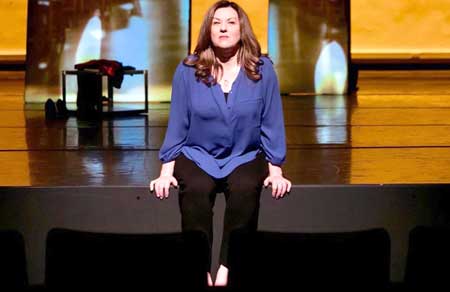Play
Written and performed by
Gioia De Cari
The Nora Theatre Company
Central Square Theater
Central Square, Cambridge
September 12-23, 2018

in “Truth Values: One Girl’s Romp Through The M.I.T. Male Math Maze”
Photo: Courtesy of Central Square Theater
Somehow drawn into math by an identification with her father and a desire to please him, among other things, Gioia De Cari, the talented playwright and solo performer of this delightful and moving show found herself a graduate student in mathematics at M.I.T. Now middle-aged and a professional playwright and actor, De Cari reflects on her time at M.I.T. and gives a tour de force performance that embodies not only herself as a character but a retinue of colleagues and professors, brought to life humorously, critically, incisively, endearingly.
The challenge of being a woman mathematician in training at M.I.T. becomes a focus, especially in the earlier part of the play. If you don’t do math you can always make babies seems the constant refrain by a lot of male colleagues and professors to De Cari, who, as a young woman some decades ago, faced, unnervingly, this sort of sexist prejudice on a regular basis. Many of those male professors who offered such bits of advice are rendered with precision and hilarity through De Cari’s astute capacity for impersonation.
Quoting the notorious comment by past president of Harvard University Lawrence Summers some years later that innate differences between men and women have resulted in the difference in number of men and women in science and technology, De Cari utters I wanted to yell.
Other women graduate students in the department do appear in the narrative, and they pose their own challenges. Despite female competition within the male-dominated context of M.I.T. math department of the time, De Cari’s narrative demonstrates how those female relationships did sometimes grow and develop.
De Cari’s narrative has a broad sweep, mostly involving male challenges to her participation in the field, but, as well, takes note of her own complex and conflicting set of inclinations and desires, finally pitting theater work against a commitment to mathematics.
She notes at the outset that I used to be a mathematician interested specifically in logic, but came to see something of the narrowness of scientific truth. Inclined to see truth as more blurry and fluid, the protagonist, even while in graduate school, is inclined to play with multivalued logics which grow out of Godel’s Theorem, which themselves formally challenge a dual and stratified notion of truth.
The dramatic evolution of De Cari’s story is curiously played out, but leaves one wondering what made De Cari take the direction she did. There are hints, and there is this show itself as evidence of a certain turn, but questions about destiny and about the resolution of the issue of a male-dominated field at that time and particularly at M.I.T. and how that influenced De Cari’s trajectory, remain as ambiguities.
Despite those narrative ambiguities, the show is so wonderfully written and performed that it is completely enjoyable. De Cari has considerable talents as an actor and embodies the quite large cast of personified characters clearly, often hilariously, and compellingly, resulting in not only an entertaining but ultimately quite moving work.
– BADMan
Leave a Reply